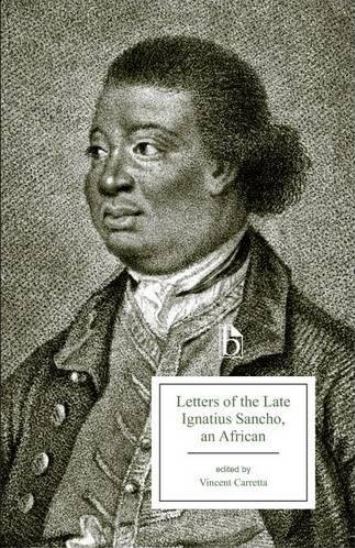Sancho's Correspondence with John Meheux
These two letters were written to John Meheux in the last years of Sancho's life. Meheux was, it seems, a minor artist and print-maker and a close friend of Sancho; 29 of Sancho's letters are addressed to him. In the first of these two letters, Sancho apologises for having overlooked Meheux's letter that came with a gift of a pig. It is one of Sancho's most exuberant pieces, demonstrating his great love of language. The letter is marred, however, by an unpleasant moment of casual antisemitism, a comment that has led some critics to question the extent of Sancho's 'universal toleration'. In the second letter, Sancho appears to be offering some light-hearted criticism of one of Meheux's artistic offerings. Keith Sandiford describes the letter as 'a sharp sneer at the painting's clichés and a withering attack on the painter's style'. I would argue, however, that the 'abuse' here is what Angela Carter, writing in another context, has called 'the unmistakable language of male affection'. It is also a conscious use of irony, here employed for personal rather than political effect, but highly suggestive of Sancho's willingness to employ irony for political ends. Above all, this letter is a bit of fun, showing Sancho's knowledge of the language of art criticism, but demonstrating that he was not in thrall to that rarefied discourse.
VOLUME I: LETTER L
TO MR. M[EHEUX].
September 16, 1777
Sir, he is the confounded'st—dunderhead—sapscull—looby—clodpate—nincompoop—ninnyhammer—booby-chick—farcical—loungibuss—blunderbuss—this good day in the three kingdoms!—You would bless yourself, were it possible for you to analyze such a being—not but his heart is susceptible of a kind of friendly warmth—but then so cursed careless—ever in a hurry—ever in the wrong, at best but blundering about the right.—Why now, for example, wen you sent the——, I can make oath, if need be—that the dunce I speak of, longed more for a letter than the animal—the basket was searched with hurry—not care;—no letter! well it can't be help'd—his head ach'd—he had not time, &c. &c.—the P[ig]—was disengaged from the basket—the straw consigned to the chimney;—this being rather a coolish morning—a little fire was thought necessary—and in raking up the loose dirty waste stuff under the grate—there appeared a very bloody letter, which seemed unopened;—your hand-writing was discernible through the dirt and blood;—curiosity and affection ran a race to pick up and examine it—when, behold it proved to be the companion of the P[ig]—, but so effaced with blood—that very—very little of my friends good sense could be made out.—Your poor letter is a type of what daily happens—merit oppressed and smothered by rubbish.—Alas! poor letter, it shared the fate, the poor world, which we inhabit, will hereafter undergo—one bright gleam of imitation of the mind that dictated it—some few sparks.—Alas! alas! my poor letter—pass but a few years—perhaps a few months—thy generous friendly compost may—thy friend whose heart glows while he writes—who feels thy worth—yea, and reveres it too.—Nonsense, why we know the very hinges of our last cradles will rust and moulder;—and that, in the course of another century, neither flesh, bone, coffin, nor nail—will be discernible from mother earth.—Courage—while we live—let us live—to Virtue—Friendship—Religion—Charity—then drop (at death's call) our cumbrous (you are thin) load of flesh, and mount in spirit to our native home.—Bless us, at what a rate have I been travelling!—I am quite out of breath—Why! my friend, the business was to thank you for the pig.—Had you seen the group of heads—aye, and wife ones too—that assembled at the opening of the fardel—the exclamations—oh! the finest—fattest—cleanest—why, sir, it was a pig of pigs;—the pettitoes gave us a good supper last night—they were well dressed—and your pig was well eat—it dined us Sunday and Monday.—Now, to say truth, I do not love pig—merely pig—I like not—but pork coined—alias—salted—either roast or boiled—I will eat against any filthy Jew naturalized—or under the bann.—On Saturday-night the newsman brought me the two papers of J — 13th and 20th;—right joyful did I receive them—I ran to Mrs. Sancho—with I beg you will read my friend's sensible and spirited defence of—of, &c.—She read—though it broke in upon her work—she approved;—but chance or fortune—or ill-luck—or what you ever mean by accident—has played us a confounded trick—for since Saturday they have—both papers—disappeared—without hands—or legs—or eyes—for no one has seen them;—bureau—boxes—cupboards—drawers—parlour—chamber—shop—all—all has been rummaged—pockets—port-folio holes—corners—all been searched;—did you see them?—did you?—Where can they be?—I know not—nor I—nor I—but God does!—Omnipotence knoweth all things.—It has vexed me—fretted dame Sancho—teazed the children—but so it;—hereafter I suppose they will be found in some obvious (though now unthought of) place, and then it will be, Good Lord, who could have thought it!
Where is the Jack ass business—do not be lazy—I feel myself a party concerned—and when I see you, I have a delicious morsel of true feminine grace and generosity to shew you.—I shall not apologize for this crude epistle—but mark and remark—I do thank you in the name of every Sancho, but—self—they eat, and were filled;—I have reason to thank you—but—as I do not affect pig—in a piggish sense—I hold myself excepted;—and, although I did eat—and did also commend, yet I will not thank you, that's poss.
I. SANCHO.
The papers are found, as you will see—here is one, and a piece, it has suffered through ignorance;—but what cannot be cured, must be endured.
VOLUME II: LETTER XLIII
To MR. M[EHEUX]
October 17, 1779
No! you have not the least grain of genius—alas! description is a science—a man should in some measure be born with the knack of it.—Poor blundering M[eheux], I pity thee—thou art a bungler in every thing—ask the girls else.—You know nothing of figures—you write a wretched hand—thou hast a nonsensical style—almost as disagreeable as thy heart - thy heart, though better than thy head—and which I wish from my soul (as it now is) was the worst heart in the three kingdoms—thy heart is a silly one—a poor cowardly heart—that would shrink at mere trifles—though there were no danger of fine or imprisonment:—for example—come, confess now—could you lie with the wife of your friend? could you debauch his sister? could you defraud a poor creditor? could you by gambling rejoice in the outwitting a novice of all his possessions?—No! why then thou art a silly fellow—incumbered with three abominable inmates;—to wit—Conscience—Honesty—and Good—nature—I hate thee (as the Jew says) because thou art a Christian.
And what, in the name of common sense, impelled thee to torment my soul, with thy creative pen drawing of sweet A-r-bn-s? I enjoyed content at least in the vortex of smoak and vice—and lifted my thoughts no higher than the beauties of the park or—gardens.—What have I to do with rural deities? with parterres—fields—groves—terraces—views—buildings—grots—temples—slopes—bridges—and meandring streams—cawing rooks—billing turtles - happy swains—the harmony of the woodland shades—the blissful constancy of rustic lovers?—Sir, I say you do wrong to awaken ideas of this sort:—besides, as I hinted largely above—you have no talent—no language—no colouring—you do not groupe well—no relief—false light—no blending of tints—thou art a sad fellow, and there is an end of it.
S[tevenso]n, who loves fools (he writes to me) but mum; S[tevenso]n wishes to have the honor of a line from quondam friend M[eheux]: now M[eheux] is an ill—natured fellow, but were it contrariwise—and M[eheux] would indulge him—I would enclose it in a frank—with something clever of my own to make it more agreeable.—Sirrah! refuse if you dare—I will so expose thee—do it—'tis I command you:—S[tevenso]n only intreats—you have need of such a rough chap as Sancho to counterpoise the pleasures of your earthly paradise. - Pray take care of your Eve—and now, my dear M[eheux], after all my abuse, let me conclude
Yours affectionately,
I. SANCHO
POSTSCRIPT
The tree of knowledge has yielded you fruit in ample abundance:—may you boldly climb the tree of life—and gather the fruits of a happy immortality—in which I would fain share, and have strong hope, through the merits of a blessed Redeemer—to find room sufficient for self—and all I love—which to say what I glory in comprehend the whole race of man—and why not? Namby—Pamby. M[eheux] cannot write to S[tevonso]n till I have your letter to enclose to him—if there is any delay, the fault is not mine.
About this extract
Sancho's correspondence with John Meheux first appeared in The Letters of the Late Ignatius Sancho, an African, published in 1782.
Sancho's Letters was published in five different editions between 1782 and 1803 before going out of print until the 1960s. The book is now available in several editions, including a paperback edition with notes and an introduction, edited by Vincent Carretta and available from:




